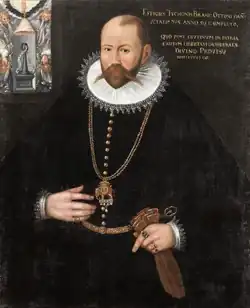Tycho Brahe

Tycho Brahe (born Tyge Ottesen Brahe; 14 December 1546 – 24 October 1601), generally called Tycho for short, was a Danish astronomer of the Renaissance, known for his comprehensive and unprecedentedly accurate astronomical observations.
Quotes
- For it is now quite clear to me that there are no solid spheres in the heavens.
- J. L. E. Dreyer (ed.) Tychonis Brahe opera omnia, vol. 3, p. 111, ll. 17–18. Reported in Edward Rosen (ed.) Three Copernican Treatises (Columbia UP, 1939) introduction, p. 12
- But there really are not any spheres in the heavens...and those which have been devised by the authors to save the appearances exist only in the imagination, for the purpose of permitting the mind to conceive the motion which the heavenly bodies trace in their course and, by the aid of geometry, to determine the motion numerically through the use of arithmetic...Of course, almost the whole of antiquity and also very many recent philosophers consider as certain and unquestionable the view that the heavens are made of a hard and impenetrable substance, that it is divided into various spheres, and that the heavenly bodies, attached to some of these spheres, revolve on account of the motion of these spheres. But this opinion does not correspond to the truth of the matter...
- Tychonis Brahe opera omnia, vol. 4, p. 222, ll. 24–35. — Three Copernican Treatises (1939) p. 12
- Simplicibus itaque verbis gaudet Mathematica Veritas, cum etiam per se simplex sit Veritatis oratio.
- Mathematical Truth therefore rejoices in simple words, since the language of Truth is itself simple.
- Epistolarum astronomicarum liber primus (1596) in Tychonis Brahe opera omnia, vol. 6, p. 23, l. 32

- When on the above mentioned day [November 11], a little before dinner...I was returning to that house, and during my walk contemplating the sky here and there since the clearer sky seemed to be just what could be wished for in order to continue observations after dinner, behold, directly overhead, a certain strange star was suddenly seen, flashing its light with a radiant gleam and it struck my eyes. Amazed, and as if astonished and stupified, I stood still, gazing for a certain length of time with my eyes fixed intently upon it and noticing that same star placed close to the stars which antiquity attributed to Cassiopeia. When I had satisfied myself that no star of that kind had ever shone forth before, I was led into such perplexity by the unbelievability of the thing that I began to doubt the faith of my own eyes, and so, turning to the servants who were accompanying me, I asked them whether they too could see a certain extremely bright star when I pointed out the place directly overhead. They immediately replied with one voice that they saw it completely and that it was extremely bright. But despite their affirmation, still being doubtful on account of the novelty of the thing, I inquired of some country people who by chance were travelling past in carriages whether they could see a certain star in the height. Indeed, these people shouted out that they saw that huge star, which had never been noticed so high up. And at length, having confirmed that my vision was not deceiving me, but in fact that an unusual star existed there, beyond all type, and marvelling that the sky had brought forth a certain new phenomenon to be compared with the other stars, immediately I got ready my instrument. I began to measure its situation and distance from the neighbouring stars of Cassiopeia, and to note extremely diligently those things which were visible to the eye concerning its apparent size, form, colour, and other aspects.
- On the supernova of 1572. Reported in David Clark, Superstars (J. M. Dent & Sons, 1979) ch. 8
- An astronomer must be cosmopolitan because ignorant statesmen can not be expected to value their services.
- An Itinery written by Fynes Morrison, &c. (London, 1617) fol., p. 60, quoted in J. L. E. Dreyer, Tycho Brahe (Edinburgh, 1890) p. 261. — Reported in Arthur Koestler, The Sleep Walkers (NY: Macmillan, 1959) pt. 4, ch. 4, sec. 4, p. 295
- Those who study the stars have God for a teacher.
- Reported in Bob Perlongo, The Everyday Almanac, 2nd ed. (1995 [1979]) p. 15
- Let me not seem to have lived in vain.
- Last words, in Dreyer (1890) p. 386. — The Sleep Walkers (1959) pt. 4, ch. 5, sec. 2, p. 311
Quotes about Tycho
- Reach me down my Tycho Brahé, — I would know him when we meet,
When I share my later science, sitting humbly at his feet.- Sarah Williams, "The Old Astronomer", st. 1. Twilight Hours (1868)